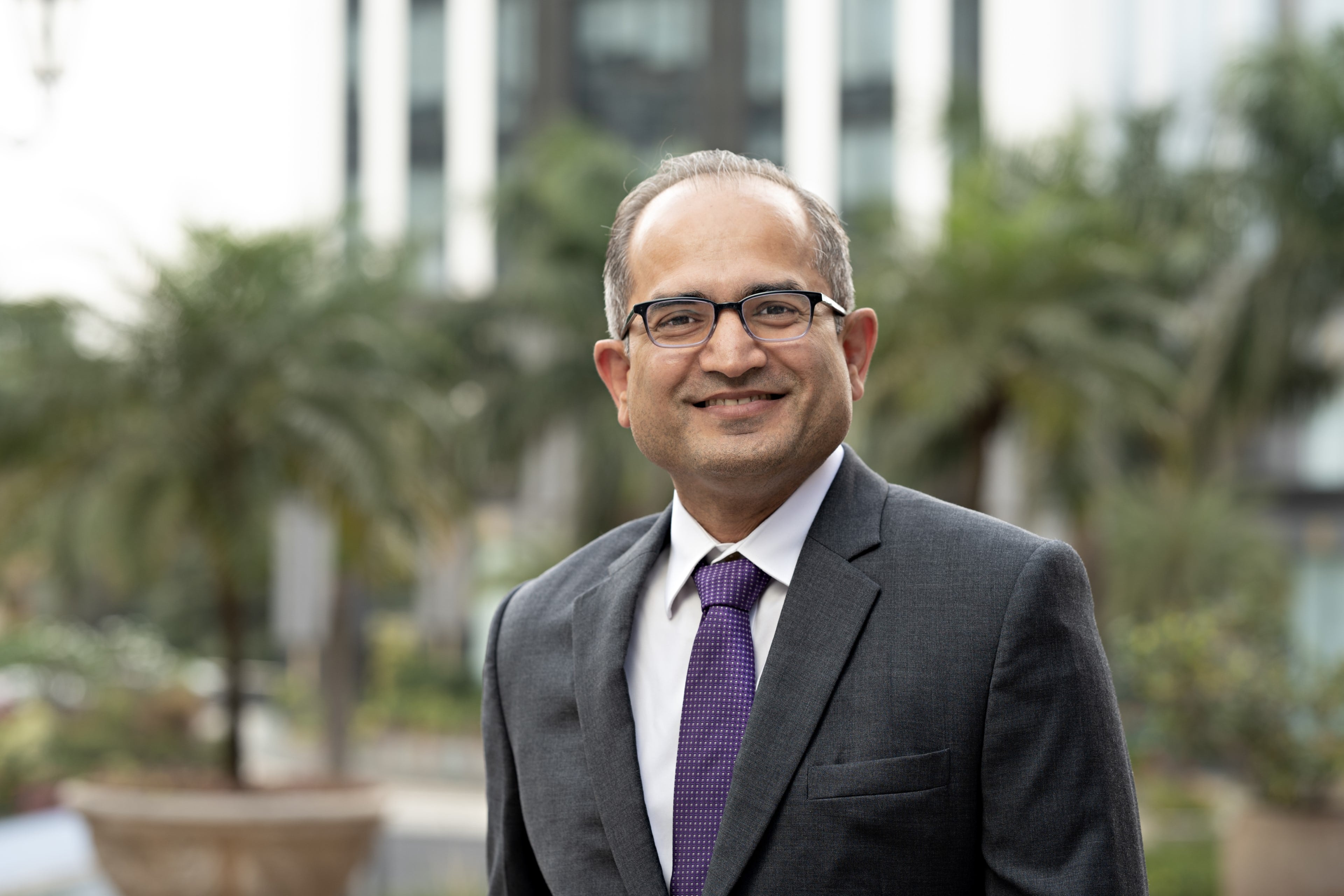EY refers to the global organization, and may refer to one or more, of the member firms of Ernst & Young Global Limited, each of which is a separate legal entity. Ernst & Young Global Limited, a UK company limited by guarantee, does not provide services to clients.
Podcast transcript: Generative AI's potential to transform the healthcare sector
20 minute read | 19 Jul 2023
In conversation with:
Pallavi: Hello, this is Pallavi Janakiraman, welcoming you to a new episode of EY India Insights podcast. Today, we are discussing the impact of Generative AI in healthcare, and also its transformative potential. Joining me is Ram Deshpande, tech consulting Partner with EY India. Ram’s expertise lies in business strategy, digital transformation, and market development. Ram has collaborated with a number of Fortune 500 organizations across diverse sectors, spanning retail, consumer products, manufacturing, and government verticals. Ram, welcome to the podcast.
Ram: Thank you, Pallavi. It is great to be here.
Pallavi: Could you tell us how Generative AI is being utilized in the healthcare industry? Is it helping us improve patient care and outcomes?
Ram: Generative AI or Generative Adversarial Networks (GANs) is artificial intelligence are capable of creating content such as images, music, text, and videos. It clearly provides significant improvements and multiple opportunities in the healthcare sector, especially as it helps in enhancing patient care, lowering cost, and boosting the operational efficiency of the hospitals or the care providers. Generative AI can also be used in drug discovery, disease diagnosis, personalized patient treatment plans, and medical research. There are a lot of use cases which have come up in recent times.
Pallavi: What are some of the specific applications of Generative AI in healthcare, such as in drug discovery or medical imaging analysis?
Ram: Let us look at different ways in which Generative AI helps. There are two types of Generative AIs – one is unsupervised, and the other is supervised Generative AI. Unsupervised Generative AI works on unstructured data, which is in the form of images and documents. This type of AI is helpful when there is a large amount of data available, but it has little or no guidance on how to analyze it. The supervised Generative AI learns from the labels of the data and also provides a lot more meaningful insights using those labels and categories. The machines learn from this data and can generate the content that fits in a predefined category.
Multiple use cases have come up in drug discovery or in medical image processing. There are medical simulations as well. Many hospitals, caregivers and people in the healthcare industry are trying medical chatbots. There is also medical research where you use DNA and genes data to analyze the condition of the patient and use that data to predict the health conditions or any possibility of diseases.
Generative AI also helps give very personalized care to the patients, as you have a large set of data which has similar conditions. You can simulate the data and analyze that for a particular condition, depending on their health, food habits, lifestyle, what kind of treatment should be given to a patient for a particular disease, and more. This can accelerate the overall patient care and enhance the patient experience.
Disease diagnosis is another area where there is a significant development in the use of Generative AI. Since Generative AI can manage large volumes of data and then analyze it, it compares that data with a specific scenario or specific disease. You can then come up with a focused treatment plan for that patient, making the treatment very personalized.
It is a little early, but drug discovery and clinical trials are other areas where there is a lot of research on using Generative AI. The technology can actually create a few molecules and simulate how a particular drug will behave for a particular medical condition. These simulations can be used by doctors for treating patients depending on the patient’s condition. There are a lot of applications, and Generative AI is being used by various healthcare service providers as well as researchers to come up with very personalized and enhanced care, from curative to predictive, for the patient.
Pallavi: While Generative AI offers such promising advancements, what are the potential ethical considerations and challenges associated with using Generative AI in healthcare?
Ram: This concern has been raised across the board because Generative AI deals with personal data or health data of an individual, which clearly falls under Personal Identifiable Information (PII). While their (patients’) data is used for analysis, simulations, as well as to predict how a particular disease can be treated, it is personal data after all. There are concerns around how that data will be used by algorithms.
The other aspect is how the Generative AI system gives you an analysis of a particular decision. At any point in time, what treatment or what line of thinking Generative AI has taken and why it has taken that line of treatment, or why it is recommending that line of treatment, needs to be traced. The transparency is still not built in the tool sets, which is another concern.
The third concern, which is related to the ethical aspect, is the biases. Generative AI is a tool which is trained based on the data fed to it. Data itself might have biases depending on the sources. The health conditions as well as other data from the US may or may not apply exactly to the conditions in India or in Southeast Asia because of different food habits, lifestyle, genes, and multiple such factors. So, there could be biases in the output which is coming from gen AI. Last, but not the least, is that Generative AI output can be used to bias the thinking of people. It is true that ethical considerations in Generative AI are serious concerns, and these are being considered by the government and various regulatory bodies.
Pallavi: Are there any examples of successful implementations of Generative AI in healthcare and the impact that they have created in the healthcare sector?
Ram: It is a little early to think of the success, but there are a few research papers that talk about Generative AI being able to automate some of the healthcare services in the range of 50% to 55%. Some studies also show that Generative AI will reduce 25% to 30% of wait time in the retail healthcare space. These are some of the benefits that are very clearly coming out now.
Coming to the success stories, it may not be fair on my part to quote since I have not been a part of those cases, but there are examples available in the public domain. One has developed a medical chatbot that uses Generative AI to ask patients about their symptoms and deliver personalized medical services. The other example, which is around personalized treatment plans, is of Mayo Clinic. They are creating a deep learning algorithm that can predict the risk of complications for a patient after surgery, and then generate a very personalized treatment plan.
Another example, which has been discussed on multiple forums, is related to the scenarios that can be created or simulated for the treatment of sepsis, which is a life-threatening condition related to blood vessels. The University of Michigan has developed a Generative AI algorithm that can simulate various scenarios for treating sepsis. In India, we are at an early stage, but many healthcare providers are already using AI to drive personalized care for patients.
Pallavi: Are there any regulatory guidelines or frameworks in place to govern the use of Generative AI in the healthcare sector?
Ram: Most countries have come up with regulatory guidelines around security of patient data: how it should be handled as well as where it can be stored after the patient’s analysis and treatment; the direction in which a particular disease has to be treated using the data; and how that should be made public.
India has taken a slightly different approach. While there were guidelines published by the Government of India in 2018 and then the revised guidelines published in 2022 related to overall usage of artificial intelligence, India has taken the position that we want to be number one in this technology. Currently, India is not restricting any usage of the AI technology, but there will be regulations on usage of our data which is not yet published. I am sure the government is creating a policy and guidelines on Generative AI.
Pallavi: What do you see as the future potential of Generative AI in the healthcare sector and how do you see it evolving in the coming years?
Ram: The potential is massive. Generative AI use cases in healthcare include medical simulations, drug discovery, clinical trials, medical chatbots, medical imaging, and patient care. These are very prominent areas where there are multiple use cases. It is definitely going to enhance patient care by making it more personalized. It will also help reduce the cost of the patient care as well as drug discovery and also improve the efficacy of drugs post-clinical trials.
The medical imaging area is another area which has significant potential. I see a lot of advancements as this technology helps you look at different images such as X-rays, CT scans, and MRI scans in better resolution, which can help the caregivers and doctors make more insightful decisions.
The technology can help bring down the cost of drugs. If large data generated from clinical trials can be analyzed quickly, it will help improve the efficacy of drugs. This can also bring down the overall cost of medicines.
Generative AI will make healthcare more effective, personalized and also reduce the overall cost of the healthcare for the citizens and will bring in more operational efficiency. When you go to a hospital, check-in or during the discharge process, AI has the potential to improve time efficacy at these touchpoints. These are some of the clear benefits that you will get as the enhancements and research in Generative AI goes to the next level.
Pallavi: Thank you so much for joining us and addressing all the questions of Generative AI impact in the healthcare sector.
Ram: Thank you for inviting me.
Pallavi: Please do visit our website to know more about Generative AI in healthcare and to leave us comments on other such topics on Generative AI in the way that you would like us to explore currently signing off. Thanks for tuning in.



